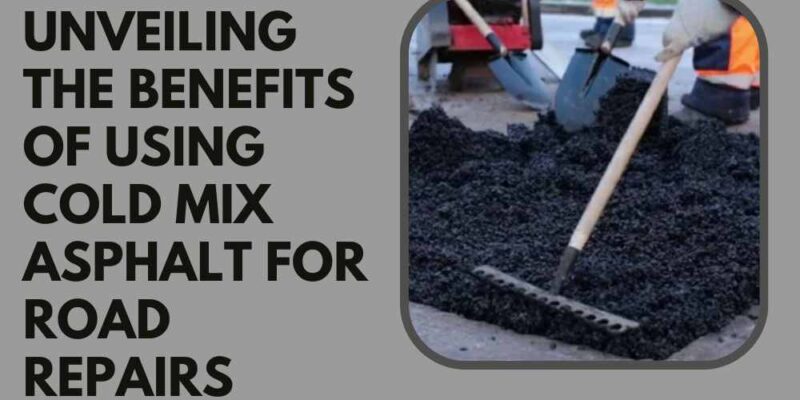
Maintaining roads is crucial for ensuring safe and smooth transportation for everyone. Whether it’s a small pothole or a major crack, timely repairs are essential to prevent accidents and prolong the lifespan of roads. One of the innovative solutions gaining traction in the road repair industry is cold mix asphalt. In this blog post, we’ll delve into the benefits of using cold mix asphalt for road repairs, exploring its advantages over traditional hot mix asphalt and why it’s becoming a preferred choice for many municipalities and contractors.
Understanding Cold Mix Asphalt
Cold mix asphalt, as the name suggests, is produced and applied at ambient temperatures, unlike hot mix asphalt which requires heating before application. It’s a mixture of bitumen emulsion, aggregates, and other additives. This composition allows cold mix asphalt to remain workable even in cooler temperatures, making it suitable for year-round road repairs, including during colder months.
Unveiling the Benefits of Using Cold Mix Asphalt for Road Repairs
How Does Cold Mix Asphalt Differ from Hot Mix Asphalt?
- Temperature Requirements: Hot mix asphalt requires high temperatures for mixing and application, typically between 280°F to 320°F (140°C to 160°C), whereas cold mix asphalt can be applied at ambient temperatures, eliminating the need for specialized equipment and energy consumption related to heating.
- Curing Time: Cold mix asphalt typically cures faster than hot mix asphalt, allowing for quicker reopening of repaired roads to traffic, minimizing disruption to commuters and businesses.
- Versatility: Cold mix asphalt can be stockpiled for extended periods without significant quality degradation, offering flexibility in scheduling repairs and reducing waste.
Advantages of Using Cold Mix Asphalt for Road Repairs
Now let’s explore the myriad benefits that cold mix asphalt brings to road repair projects:
1. Cost-Effectiveness
Cold mix asphalt offers substantial cost savings compared to hot mix asphalt. Since it doesn’t require heating, there are reduced energy costs associated with production and application. Additionally, its ease of use and faster curing times contribute to lower labor expenses.
2. Extended Working Window
With cold mix asphalt, road repair crews can work year-round, regardless of weather conditions. Its ability to remain pliable at ambient temperatures allows for repairs even in colder climates, increasing operational efficiency and minimizing downtime. Cold mix asphalt helps address road defects promptly, reducing the risk of accidents caused by potholes, cracks, and uneven surfaces. Its quick curing time also minimizes the duration of road closures, mitigating potential hazards for motorists and pedestrians.
3. Reduced Environmental Impact
The production of hot mix asphalt involves significant energy consumption and emits greenhouse gases. In contrast, cold mix asphalt production consumes less energy and generates fewer emissions, making it a more environmentally friendly option for road repairs. Moreover, its longer shelf life reduces the need for frequent reapplications, further lowering carbon footprint. Cold mix asphalt helps address road defects promptly, reducing the risk of accidents caused by potholes, cracks, and uneven surfaces. Its quick curing time also minimizes the duration of road closures, mitigating potential hazards for motorists and pedestrians.
4. Improved Safety
Maintaining safe road conditions is paramount for preventing accidents and ensuring smooth traffic flow. Cold mix asphalt helps address road defects promptly, reducing the risk of accidents caused by potholes, cracks, and uneven surfaces. Its quick curing time also minimizes the duration of road closures, mitigating potential hazards for motorists and pedestrians.
5. Enhanced Durability
Despite being applied at lower temperatures, cold mix asphalt exhibits excellent durability and resistance to wear and tear. Its flexibility allows it to adapt to varying weather conditions, preventing cracking and deterioration, thereby extending the lifespan of repaired roads. Cold mix asphalt helps address road defects promptly, reducing the risk of accidents caused by potholes, cracks, and uneven surfaces. Its quick curing time also minimizes the duration of road closures, mitigating potential hazards for motorists and pedestrians.
Conclusion
Cold mix asphalt offers a host of benefits that make it an attractive choice for road repair projects. From cost-effectiveness and extended working windows to reduced environmental impact and improved safety, its advantages over traditional hot mix asphalt are clear. By embracing cold mix asphalt technology, municipalities and contractors can streamline road maintenance efforts, enhance infrastructure resilience, and contribute to sustainable development. As the demand for efficient and eco-friendly road repair solutions continues to rise, cold mix asphalt is poised to play a pivotal role in shaping the future of transportation infrastructure worldwide.
Note :- For more stories and info like this, emperiortech.com is the place to be.










